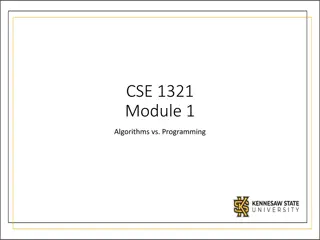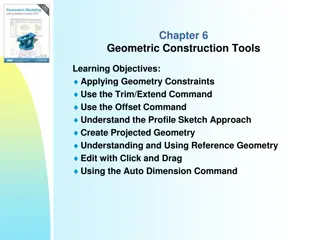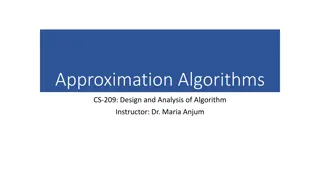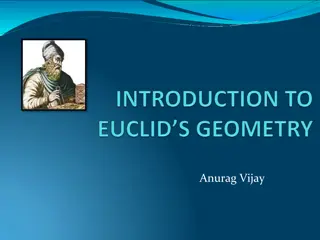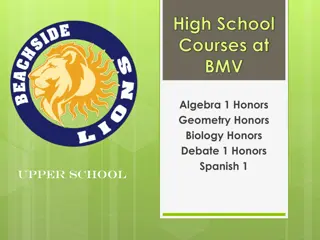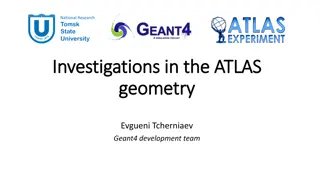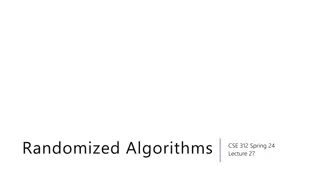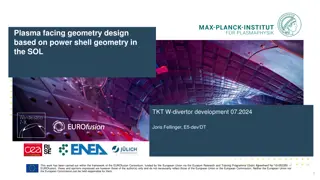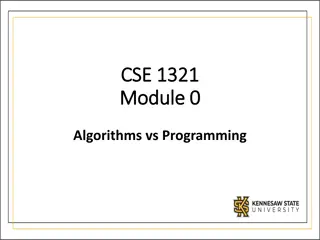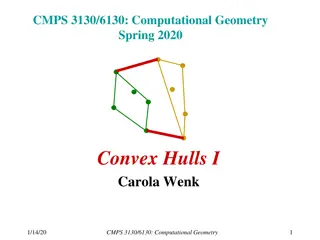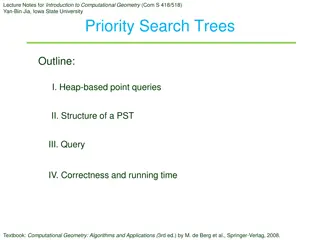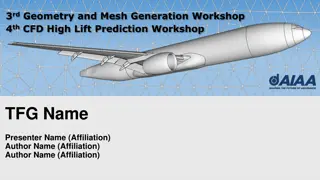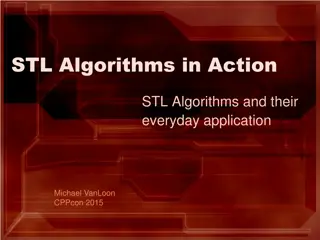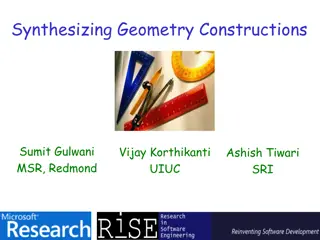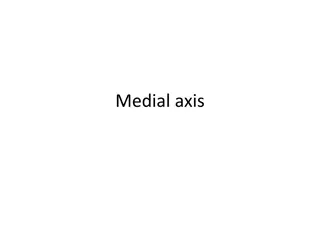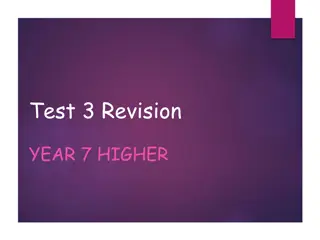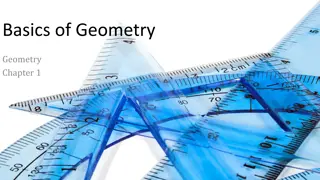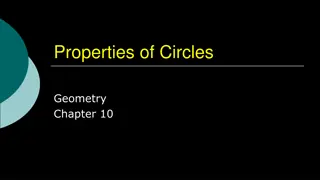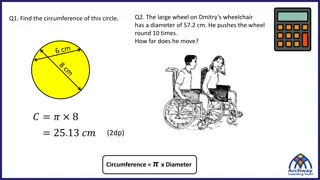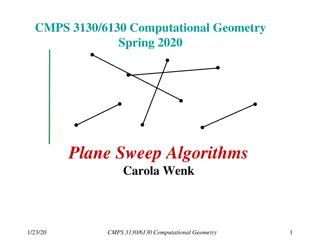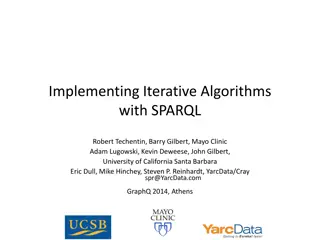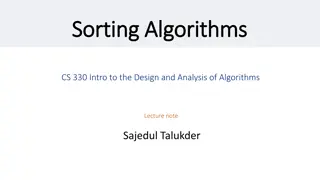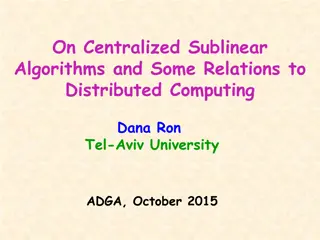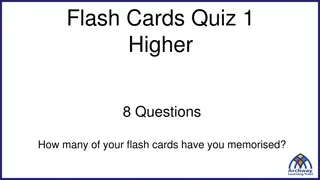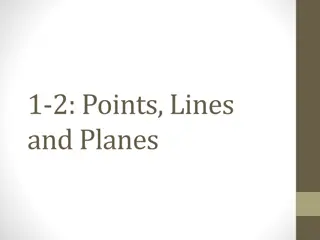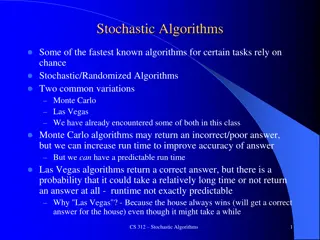Algorithms and Programming Fundamentals
Learn about algorithms, programming, and abstraction in computing. Explore the definition and properties of algorithms, the relationship between algorithms and programming, and the concept of abstraction. Discover how algorithms are like recipes and how abstraction simplifies complex tasks in comput
1 views • 17 slides
Autodesk Inventor Geometric Construction Tools Overview
Explore the functionality of Autodesk Inventor's geometric construction tools, such as applying geometry constraints, utilizing trim/extend and offset commands, understanding profile sketches, creating projected geometry, and editing sketches with click and drag. Discover how to enhance efficiency i
3 views • 12 slides
Line Sweep Algorithms in Geometry
Line sweep algorithms are a powerful tool for solving geometry problems by simulating the sweeping of a vertical line across a plane. This approach allows for efficient processing of important points and addressing various geometric challenges, such as finding the closest pair of points, determining
2 views • 10 slides
Near-Optimal Quantum Algorithms for String Problems - Summary and Insights
Near-Optimal Quantum Algorithms for String Problems by Ce Jin and Shyan Akmal presents groundbreaking research on string problem solutions using quantum algorithms. The study delves into various key topics such as Combinatorial Pattern Matching, Basic String Problems, Quantum Black-box Model, and mo
1 views • 25 slides
Approximation Algorithms: Types, Terminology, and Performance Ratios
Approximation algorithms aim to find near-optimal solutions for optimization problems, with the performance ratio indicating how close the algorithm's solution is to the optimal solution. The terminology used in approximation algorithms includes P (optimization problem), C (approximation algorithm),
2 views • 10 slides
Euclid's Geometry: The Fundamentals Explained
Euclid, known as the Father of Geometry, introduced the principles of geometry in Egypt. His work included definitions, axioms, and postulates that laid the foundation for geometric reasoning. Euclid's Five Postulates are crucial in understanding the basic concepts of geometry. This article provides
2 views • 12 slides
Diverse High School Courses at BMV: Algebra, Geometry, Biology, Debate, Spanish
Explore a variety of high school courses at BMV including Algebra 1 Honors, Geometry Honors, Biology Honors, Debate, and Spanish 1. These courses offer a comprehensive range of subjects from math to language arts, preparing students for advanced studies and fulfilling graduation requirements. Studen
0 views • 19 slides
Combining Graph Algorithms with Data Structures and Algorithms in CSE 373 by Kasey Champion
In this lecture, Kasey Champion covers a wide range of topics including graph algorithms, data structures, coding projects, and important midterm topics for CSE 373. The lecture emphasizes understanding ADTs, data structures, asymptotic analysis, sorting algorithms, memory management, P vs. NP, heap
2 views • 38 slides
Insights from Geant4 Development Team on ATLAS Geometry Investigations
Investigating the ATLAS geometry using Geant4, the team from National Research Tomsk State University presented findings at the 23rd Geant4 Collaboration Meeting. They focused on solid methods, CPU consumption, and optimizing geometry descriptions to enhance simulation performance. Specifics of the
0 views • 40 slides
Practical Geometry Guide by S.N. Mishra
Practical Geometry Made by S.N. Mishra is a comprehensive guide that covers various aspects of practical geometry with detailed explanations and visual aids. The guide includes step-by-step instructions, illustrations, and practical examples to help users grasp the concepts easily. Whether you are a
1 views • 12 slides
Randomized Algorithms: A Deep Dive into Las Vegas and Monte Carlo Algorithms
Randomized algorithms incorporate randomness into computations, with Las Vegas algorithms always providing the correct answer but varying in time, while Monte Carlo algorithms occasionally give wrong answers. Quick Sort is a classic Las Vegas algorithm that involves pivoting elements for sorting. Ch
4 views • 21 slides
Geometry Test Prep Questions
Prepare for your geometry test by reviewing essential questions on points, lines, planes, distances, and intersections. Use the provided images to practice concepts such as collinear points, intersecting lines, opposite rays, and more. Challenge yourself to solve distance problems without using form
1 views • 31 slides
Development of Plasma-Facing Geometry Design for W-Divertor in SOLTKT Fusion Reactor
Study on the plasma-facing geometry design based on power shell geometry in the SOL TKT W-divertor development for the fusion reactor. The research involves fundamental differences in divertor baffle design, materials used, heat load requirements, interface connections, and key design concerns. The
0 views • 14 slides
Algorithms and Programming: A Visual Introduction
Explore the fundamental concepts of algorithms and programming through visual representations and practical examples. Learn about algorithmic thinking, abstraction, recipe-like algorithms, and the importance of logical steps in accomplishing tasks. Discover how algorithms encapsulate data and instru
1 views • 17 slides
Convex Hulls in Computational Geometry
Convex hulls are a fundamental concept in computational geometry, representing the smallest convex shape that contains a set of points. The process involves defining the convexity of a set, determining the unique convex polygon, and computing the convex hull efficiently using algorithms. This conten
0 views • 9 slides
Distributed Algorithms for Leader Election in Anonymous Systems
Distributed algorithms play a crucial role in leader election within anonymous systems where nodes lack unique identifiers. The content discusses the challenges and impossibility results of deterministic leader election in such systems. It explains synchronous and asynchronous distributed algorithms
2 views • 11 slides
Introduction to Priority Search Trees in Computational Geometry
This lecture outlines the structure and query process of Priority Search Trees (PST) in computational geometry. It covers heap-based point queries, range trees for windowing queries, handling query ranges in 1D and 2D spaces, and using heaps to efficiently handle query ranges. The content discusses
1 views • 18 slides
Mathematical Analysis of Algorithms in CMPE371 - Fall 2023-2024
Explore the mathematical analysis of algorithms in CMPE371 for Fall 2023-2024, focusing on non-recursive and recursive algorithms. Learn how to analyze non-recursive algorithms by deciding on input size parameters, identifying basic operations, and simplifying summations. Dive into recursive algorit
1 views • 31 slides
Pseudodeterministic Algorithms and Their Application in Search Problems
Pseudodeterministic algorithms provide a unique approach to the search problem associated with binary relations, offering an error reduction technique while sacrificing the ability to approximate the average value of a function. By introducing m-pseudodeterministic and pseudo-pseudodeterministic alg
1 views • 6 slides
CFD Workshop on Geometry Generation and Meshing Techniques
This workshop focused on the use of geometry modeling and mesh generation techniques in Computational Fluid Dynamics (CFD) simulations. Participants discussed key questions, findings, lessons learned, supporting evidence, and future plans relating to geometry manipulation, mesh quality, and the impa
0 views • 8 slides
STL Algorithms: A Practical Guide
Explore the world of STL algorithms through an insightful discussion on the definition of algorithms, the advantages of using STL algorithms over raw loops, and the different classes of STL algorithms available. Discover how these pre-built libraries can enhance your programming efficiency and code
1 views • 99 slides
Exploring the Role of Algorithms in Game Design
Delve into the world of algorithms in game design, from understanding the fundamental concept of algorithms to their pervasive presence in various aspects of gaming, such as military simulations, medical simulations, and gameplay mechanics. Explore how algorithms shape experiences in different types
0 views • 10 slides
Geometry Constructions: A Synthesis of Theory and Practice
Explore the world of geometry constructions through ruler/compass-based techniques, combining logical reasoning and visual elements to create engaging exercises. Discover the programming language for constructing geometric shapes, with an example problem and a specification language for geometry pro
0 views • 25 slides
The Medial Axis in Geometry
The medial axis in geometry is a fascinating concept related to Voronoi diagrams and maximal empty disks. Explore how the medial axis is constructed, its significance in the study of polygons, and its applications in modeling and algorithms. Learn about associated exercises and different algorithms
0 views • 12 slides
Geometry Concepts and Calculations Practice Questions
This content covers various topics in geometry, including decimal and fraction conversions, percentage calculations, along with missing angle calculations. It offers practice questions for students to enhance their understanding of geometry concepts.
0 views • 11 slides
Basics of Geometry: Understanding Points, Lines, and Planes
Explore the fundamental concepts of geometry in this slideshow developed to accompany the textbook "Big Ideas Geometry." Learn about points, lines, and planes, their characteristics, how they are named, and their relationships in space. Gain a clear understanding of line segments, rays, collinear po
1 views • 55 slides
Evolutionary Computation and Genetic Algorithms Overview
Explore the world of evolutionary computation and genetic algorithms through a presentation outlining the concepts of genetic algorithms, parallel genetic algorithms, genetic programming, evolution strategies, classifier systems, and evolution programming. Delve into scenarios in the forest where gi
0 views • 51 slides
Properties of Circles in Geometry
Explore the key concepts and properties related to circles in geometry, such as tangents, diameters, secants, and common tangents. Discover how tangents interact with circles and learn about the relationships between radius, diameter, and chord lengths. Enhance your understanding of circle geometry
0 views • 48 slides
Circumference and Perimeter Calculations in Geometry
Explore various geometry problems involving calculating circumferences and perimeters of shapes and circles. Practice calculating diameters, radii, and distances moved in real-life scenarios. Test your knowledge with true or false questions related to geometry concepts.
0 views • 12 slides
Online Advertising and Algorithms: Insights and Simplifications
Explore the world of online advertisements and algorithms through insightful discussions on online advertising, modern developments in online algorithms, and practical optimization strategies like budgeted allocation. Delve into topics such as decision-making under uncertainty, accessing algorithms,
1 views • 22 slides
Plane Sweep Algorithms in Computational Geometry
Plane sweep algorithms are a powerful technique in computational geometry for solving various problems efficiently. By simulating the sweep of a vertical line across the plane and maintaining a cleanliness property, these algorithms can process events at discrete points in time to update the status
1 views • 26 slides
Implementing Iterative Algorithms with SPARQL
This comprehensive guide explores the implementation of iterative algorithms with SPARQL, focusing on YarcData/Cray's approach to using these algorithms. It covers YarcData's interest in graphs, the Urika appliance, iterative algorithms in machine learning, implementation approach, and algorithms im
1 views • 12 slides
Overview of Sorting Algorithms and Quadratic Sorting - CS 330 Lecture Notes
Sorting algorithms play a crucial role in computer science and computing tasks, consuming a significant portion of computing power. Various algorithms such as Bubble Sort, Selection Sort, and Insertion Sort are discussed for sorting a list of values efficiently. Quadratic sorting algorithms like Sel
0 views • 30 slides
Sublinear Algorithms and Graph Parameters in Centralized and Distributed Computing
Centralized sublinear algorithms and their relation to distributed computing are explored, emphasizing the efficiency of algorithms in processing large inputs in sublinear time. Examples of sublinear algorithms for various objects are provided, along with the computation and approximation of graph p
1 views • 34 slides
Higher Level Flash Cards Quiz - Geometry and Mathematics
This set of flash cards quizzes your knowledge on various geometry and mathematics topics. From calculating exterior angles of polygons to determining the area of shapes and understanding correlations in graphs, test your understanding and learn new concepts. Sharpen your skills in geometry, trigono
0 views • 15 slides
Efficient Algorithms for Finding the Smallest Enclosing Disc
Explore algorithms for finding the smallest enclosing disc for a given set of objects, optimizing central placement, and ensuring minimal distance from objects. The process involves identifying critical steps, computations for passing through points, and analysis highlighting linear running times. D
0 views • 14 slides
CS260 Parallel Algorithms: Theory and Practice Review
This review covers essential topics from the CS260 Parallel Algorithms course by Yihan Sun, focusing on key concepts such as scheduler programs, cost models, reduce and scan techniques, PRAM models, atomic primitives, small algorithms, the master theorem, and sorting algorithms like Quicksort and Me
0 views • 25 slides
Introduction to Points, Lines, and Planes in Geometry
Exploring the fundamental concepts of points, lines, and planes in geometry, including definitions, examples, and postulates. Learn about collinear points, coplanar points, segments, rays, and key postulates in geometry.
0 views • 18 slides
Stochastic Algorithms: Monte Carlo and Las Vegas Variations
Stochastic algorithms, including Monte Carlo and Las Vegas variations, leverage randomness to tackle complex tasks efficiently. While Monte Carlo algorithms prioritize speed with some margin of error, Las Vegas algorithms guarantee accuracy but with variable runtime. They play a vital role in primal
0 views • 13 slides
Lock-Free and Wait-Free Algorithms in Concurrent Data Structures
Illustration of lock-free and wait-free algorithms compared to blocking algorithms, with insights on concurrent object execution, blocking vs. non-blocking algorithms, definitions, comparisons between locks, lock-free, and wait-free approaches, and explanations on making algorithms wait-free. Exampl
1 views • 23 slides
